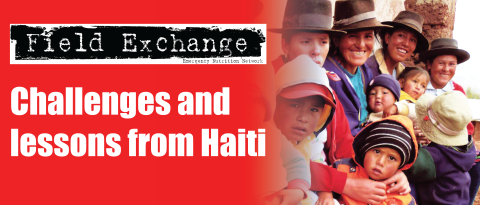Impact of conditional cash transfers in Mexico
Summary of published research1
Conditional cash transfer programmes are increasingly popular, but the impact on household nutrient consumption has not been studied. A team has recently evaluated the impact of the Programa de Apoyo Alimentario (PAL), a cash and in-kind transfer programme, on the energy and nutrient consumption of poor rural households in Mexico. The first objective of the study was to investigate whether the PAL transfer lead to the consumption of healthier household diets.
Beneficiary households received either a food basket (including micronutrient-fortified milk) or cash. A random sample of 206 rural communities in Southern Mexico was randomly assigned to one of four groups - a monthly food basket with or without health and nutrition education, a cash transfer with a cost to the government equivalent to the food basket (14 USD/month) with education, or control. The food basket contained a number of staple and basic food products and powdered whole milk (Liconsa) that was fortified with zinc, iron, vitamin C and folate. This composition conformed to the Mexican norm for food aid programmes. It contributed 450 kcals per adult in an average sized household. The impact after 14 months of exposure was estimated in a panel of 5,823 households using a double difference regression model with household fixed effects.
PAL was associated with increases (p<0.01) in the consumption of total energy (5-9%), energy from fruits and vegetables (24-28%), and energy from animal source foods (24-39%). It also increased iron, zinc and vitamins A and C consumption (p< 0.05). The consumption of energy and all nutrients was greater in the food basket group (p<0.05). The food basket had a significantly greater impact on energy and nutrient consumption than the cash transfer. One possible reason is that the local value of the food basket was an estimated 30% higher than the cost to the programme and thus to the value of the cash transfer. The proportionally greater impact on energy consumption from animal source foods and fruits and vegetables is consistent with other conditional transfer programmes in Mexico.
A key question is why households increased energy consumption when the diet at baseline was not energy deficient. This is an alarming finding given that 60% of adult women were overweight or obese in the baseline survey and the national prevalence of overweight and obesity is 72% for women and 67% for men. These results suggest a revision of food aid is needed in Mexico. This should be based on micronutrient rather than macronutrient requirements. The appropriateness of 'Liconsa' milk should also be evaluated as this seems to contribute to most of the difference between the groups in the study. Fortified whole milk may not therefore be the best vehicle to improve micronutrient intake in this population. The use of low fat milk or of micronutrient powders that do not contain energy should be considered as alternatives in this programme. However, the author's caution that the decision about use of 'Liconsa' also needs to take into account the nutritional benefits of the high quality protein and potentially positive effect on child linear growth.
The findings suggest that cash and in-kind transfers in populations that are not energy deficient should be carefully redesigned to ensure that pulling poor families out of poverty leads to improved micronutrient intake but not to increased energy consumption. While these programmes may have a positive impact on household diet, the effect may not be unequivocally healthy.
1Leroy. J et al (2010). Cash and in-kind transfers in poor rural communities in Mexico increase household fruit, vegetable and micronutrient consumption but also lead to excess energy consumption. Community and International Nutrition. First published online January 20, 2010,: doi:10.3945/jn. 109.116285
Imported from FEX website


